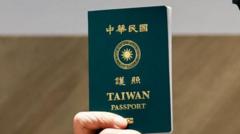Taiwan's foreign ministry has issued a strong condemnation of Somalia after the country imposed a travel ban on Taiwanese passport holders, prohibiting them from entering or transiting through Somalia. The Somali aviation authorities announced this decision, effective from April 30, as Taiwan continues to strengthen its relationship with Somaliland, a self-declared independent region that broke away from Somalia over three decades ago.
In a statement, Taiwan's foreign ministry articulated its dissatisfaction, accusing Somalia of acting under the influence of China, which insists on the “one-China principle.” This principle dictates that Taiwan is a province of China and not a separate sovereign entity. The ban has been labelled a violation of the travel rights and safety of Taiwanese citizens. The ministry has urged nationals to refrain from traveling to either Somalia or Somaliland until the situation is resolved.
While Somalia has not publicly addressed the motivations behind the travel ban, China has expressed support, describing it as a legitimate action reflecting Somalia’s commitment to the one-China stance. The relationship between Taiwan and Somaliland was solidified in 2020 when both entities established embassies in one another's capitals, a move that has angered both Somalia and China.
The diplomatic friction surrounding this ban underscores the complexities of Taiwan's status on the global stage, especially in light of the limited formal recognition it receives from other countries. Despite its independent governance, Taiwan faces ongoing threats from China, which claims sovereignty over the island.
Somaliland, which boasts its own functioning government and electoral system, remains unrecognized internationally, and the situation in Somalia is further complicated by the presence of militant groups like al-Shabaab. As tensions continue to rise, the implications of the travel ban not only affect Taiwan's citizens but also reflect larger geopolitical conflicts in the region.
In a statement, Taiwan's foreign ministry articulated its dissatisfaction, accusing Somalia of acting under the influence of China, which insists on the “one-China principle.” This principle dictates that Taiwan is a province of China and not a separate sovereign entity. The ban has been labelled a violation of the travel rights and safety of Taiwanese citizens. The ministry has urged nationals to refrain from traveling to either Somalia or Somaliland until the situation is resolved.
While Somalia has not publicly addressed the motivations behind the travel ban, China has expressed support, describing it as a legitimate action reflecting Somalia’s commitment to the one-China stance. The relationship between Taiwan and Somaliland was solidified in 2020 when both entities established embassies in one another's capitals, a move that has angered both Somalia and China.
The diplomatic friction surrounding this ban underscores the complexities of Taiwan's status on the global stage, especially in light of the limited formal recognition it receives from other countries. Despite its independent governance, Taiwan faces ongoing threats from China, which claims sovereignty over the island.
Somaliland, which boasts its own functioning government and electoral system, remains unrecognized internationally, and the situation in Somalia is further complicated by the presence of militant groups like al-Shabaab. As tensions continue to rise, the implications of the travel ban not only affect Taiwan's citizens but also reflect larger geopolitical conflicts in the region.


















